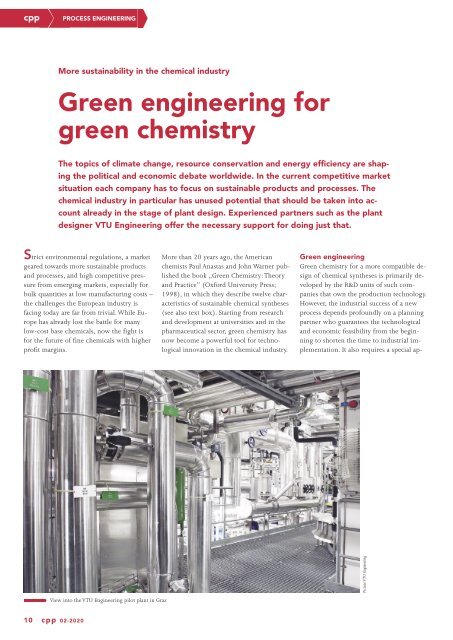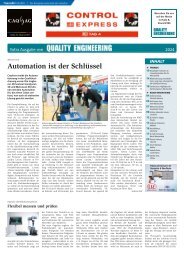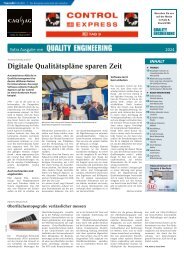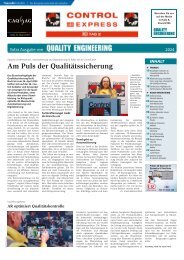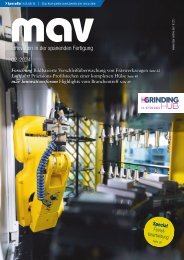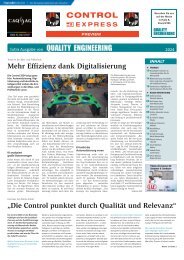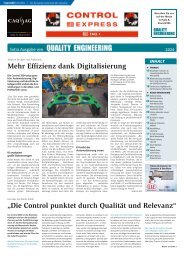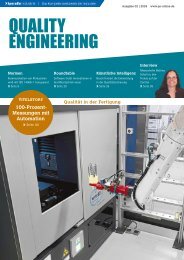cpp – Process technology for the chemical industry 02.2020
The journal cpp - Process technology for the chemical industry reports about processes, plants, apparatus and components for the chemical and pharmaceutical industry. Further topics are IT technologies, industry 4.0, digital production, MSR and automation technology and process analysis technology. The content spectrum is rounded off by explosion protection, plant safety, occupational health and safety, maintenance, site management and energy management.
The journal cpp - Process technology for the chemical industry reports about processes, plants, apparatus and components for the chemical and pharmaceutical industry. Further topics are IT technologies, industry 4.0, digital production, MSR and automation technology and process analysis technology. The content spectrum is rounded off by explosion protection, plant safety, occupational health and safety, maintenance, site management and energy management.
Create successful ePaper yourself
Turn your PDF publications into a flip-book with our unique Google optimized e-Paper software.
<strong>cpp</strong><br />
PROCESS ENGINEERING<br />
More sustainability in <strong>the</strong> <strong>chemical</strong> <strong>industry</strong><br />
Green engineering <strong>for</strong><br />
green chemistry<br />
The topics of climate change, resource conservation and energy efficiency are shaping<br />
<strong>the</strong> political and economic debate worldwide. In <strong>the</strong> current competitive market<br />
situation each company has to focus on sustainable products and processes. The<br />
<strong>chemical</strong> <strong>industry</strong> in particular has unused potential that should be taken into account<br />
already in <strong>the</strong> stage of plant design. Experienced partners such as <strong>the</strong> plant<br />
designer VTU Engineering offer <strong>the</strong> necessary support <strong>for</strong> doing just that.<br />
Strict environmental regulations, a market<br />
geared towards more sustainable products<br />
and processes, and high competitive pressure<br />
from emerging markets, especially <strong>for</strong><br />
bulk quantities at low manufacturing costs <strong>–</strong><br />
<strong>the</strong> challenges <strong>the</strong> European <strong>industry</strong> is<br />
facing today are far from trivial. While Europe<br />
has already lost <strong>the</strong> battle <strong>for</strong> many<br />
low-cost base <strong>chemical</strong>s, now <strong>the</strong> fight is<br />
<strong>for</strong> <strong>the</strong> future of fine <strong>chemical</strong>s with higher<br />
profit margins.<br />
More than 20 years ago, <strong>the</strong> American<br />
chemists Paul Anastas and John Warner published<br />
<strong>the</strong> book „Green Chemistry: Theory<br />
and Practice“ (Ox<strong>for</strong>d University Press;<br />
1998), in which <strong>the</strong>y describe twelve characteristics<br />
of sustainable <strong>chemical</strong> syn<strong>the</strong>ses<br />
(see also text box). Starting from research<br />
and development at universities and in <strong>the</strong><br />
pharmaceutical sector, green chemistry has<br />
now become a powerful tool <strong>for</strong> technological<br />
innovation in <strong>the</strong> <strong>chemical</strong> <strong>industry</strong>.<br />
Green engineering<br />
Green chemistry <strong>for</strong> a more compatible design<br />
of <strong>chemical</strong> syn<strong>the</strong>ses is primarily developed<br />
by <strong>the</strong> R&D units of such companies<br />
that own <strong>the</strong> production <strong>technology</strong>.<br />
However, <strong>the</strong> industrial success of a new<br />
process depends profoundly on a planning<br />
partner who guarantees <strong>the</strong> technological<br />
and economic feasibility from <strong>the</strong> beginning<br />
to shorten <strong>the</strong> time to industrial implementation.<br />
It also requires a special ap-<br />
Picture: VTU Engineering<br />
View into <strong>the</strong> VTU Engineering pilot plant in Graz<br />
10 <strong>cpp</strong> 02-2020


